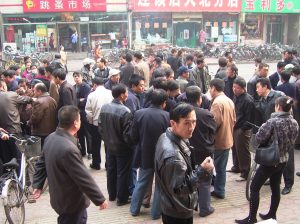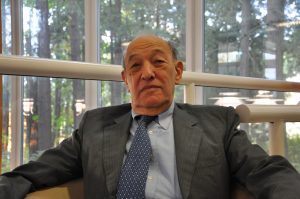为什么中国人出国打工费用这么高?
Memo #135 – 日本,新加坡和韩国是目前接纳中国非技术劳工最多的三个国家;中国人去这三个国家打工,要付8,000美元的中介费。这些钱不是给人贩子,而是给有正规执照的中介机构。事实上,通过合法途径出国打工的成本要明显高于非法迁移。这并不是中国特有的现象。在亚太地区,合法移民的比例在增加——2011年底有80多万中国人在境外就业,大大高于1990年的6万人——但是成本也大幅度增加了。其原因就在于,亚太国家依赖于中介机构管理跨国劳动力流动。
Filipina Immigrant Girls’ Lived Experience in Japan
Memo #134 – Filipina women, who entered Japan as “entertainers” or as the spouses of Japanese men, sometimes left children behind to be raised by relatives in the Philippines while they built economically viable lives in Japan. More and more, the teenage children of these migrant women are entering Japan, entering Japanese schools, and entering society as an important and recent immigrant youth population. These youth are being reunited with their mothers, beginning lives with unknown step-families, and struggling to learn Japanese – which is often their third or fourth language. Most scholars focus on how immigrant youth are victimized by an assimilationist-oriented education system, with its Japanese-only language policies and hyper-competitive high school entrance exams. But this focus allows only a small glimpse of their lived experience.
How Finnish, not East Asian Education Became a Global Reference
Memo #132 – Finnish education has become the global symbol of educational excellence since its success in the Organization for Economic Development and Cooperation’s (OECD) Programme for International Student Assessment (PISA) implemented triennially since 2000. Every year, a few thousand international visitors, including many from East Asian nations, flock to the small Nordic nation to discover “how Finland gets it right.”
「フィンランド教育ブーム」再考
Memo #132 – 2000年以来、3年毎に実施されているOECDの国際的な学習到達度調査(以下PISA)において好成績を収めたフィンランドは、優れた教育改革のモデルとして世界中の教育関係者の注目を集めている。毎年数千人もの海外教育関係者がこの北欧の小国を訪れており、東アジアからも多くの人々がそのPISA成功の「秘訣」を探りに、「フィンランド詣で」を敢行している。
Beyond Censorship in China’s Media and Cyberspace
Memo #131 – On January 9, 2012, the People’s Daily led with a glowing feature celebrating Chongqing’s attempts to achieve “common prosperity.” 30 years of market-driven reform, “letting some people get rich first,” has created one of the most unequal societies in the world. Chongqing’s innovative strategies have deep implications for China’s future, and an intense debate is currently playing out in Chinese media, old and new.
Why China isn’t Buying Eurozone Bailout Bonds (Yet)
Memo #128 – China has still not committed to invest in the European Financial Stability Facility (EFSF), the stopgap fund created to tackle the European sovereign debt crisis. Officials have actually stated that China will not use its $3.2 trillion in foreign exchange reserves to rescue other countries. Why is this so?
为何中国仍未打算购买欧元区救助债券
Memo #128 – 中国仍未就投资于欧洲金融稳定基金(EFSF)做出任何承诺。创立这一基金是为了应急解决欧洲主权债务危机问题。官方发言人已表示,中国不会使用3.2万亿美元的外汇储备拯救其他国家,为什么要这样做呢?
South Korea’s Immigrant Incorporation Strategy
Memo #127 – In July 2002, the mayor of Seoul conferred honourary residency status on Guus Hiddink, a Dutch soccer manager who advanced the Korean soccer team to the World Cup quarter finals. In contrast, in October 2009 the government deported Minu, a migrant worker and activist from Nepal, who had lived in Korea for 18 years and had been active in organizing migrant workers. These two vignettes demonstrate how the Korean government treats immigrants differentially.
한국정부의 이민자 정책
Memo #127 – 2002년 월드컵의 열기가 채가시기 전인 2002년 7월에, 서울시는 당시 대한민국 축구 국가대표팀 감독이었던 거스 히딩크 감독에게 명예 서울 시민증을 수여했다 반면 2009년 10월 한국에 18년 동안 있으면서 이주노동자 운동에 앞장섰던 네팔인 미누씨를 강제추방했다. 이 두 사건은 한국 정부의 차별적 이주자 정책을 단적으로 보여 준다.
Interview with Ezra Vogel on Deng Xiaoping’s Role in International Relations (Part 3/3)
Memo #123 – In this final instalment of our interview with Ezra Vogel, he turns first to the legacy of Deng Xiaoping. While Deng’s role in the suppression of popular protest at Tiananmen Square in 1989 will never be forgotten, the longer view will dwell on Deng as the man who changed China and steered the transformation that formed the China we see today. Professor Vogel then turns to Deng’s role in international relations, beginning with the predominant relationship with the US but also noting Canada’s special role in the 1970s and enduring relationship. Finally, Professor Vogel reflects on how he came to write this biography, and much of his public work, in a style that combines scholarship and accessibility.



